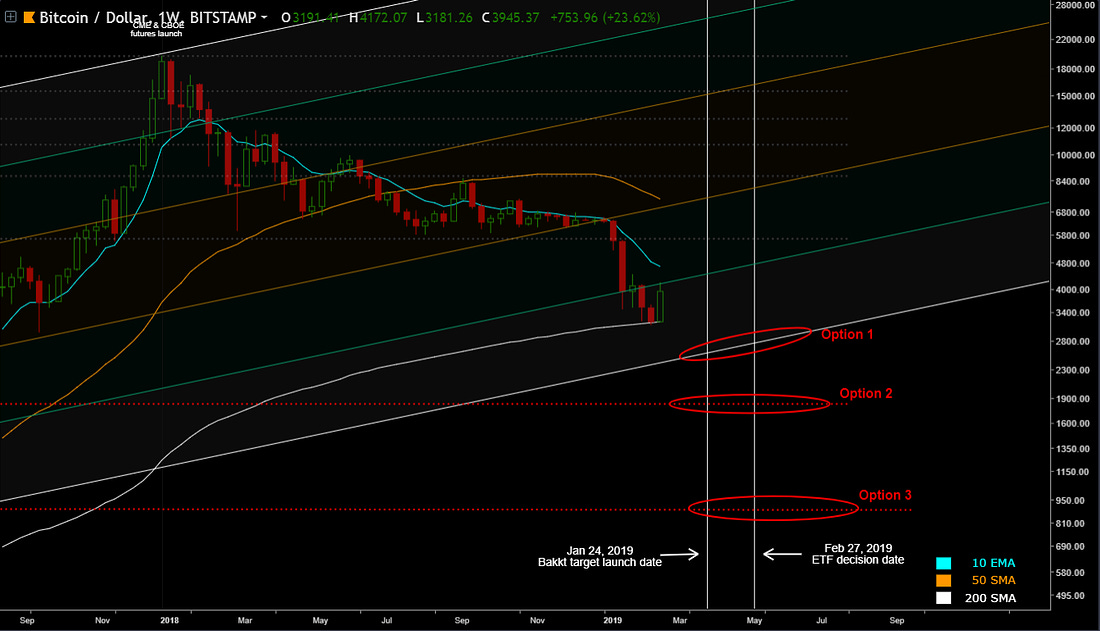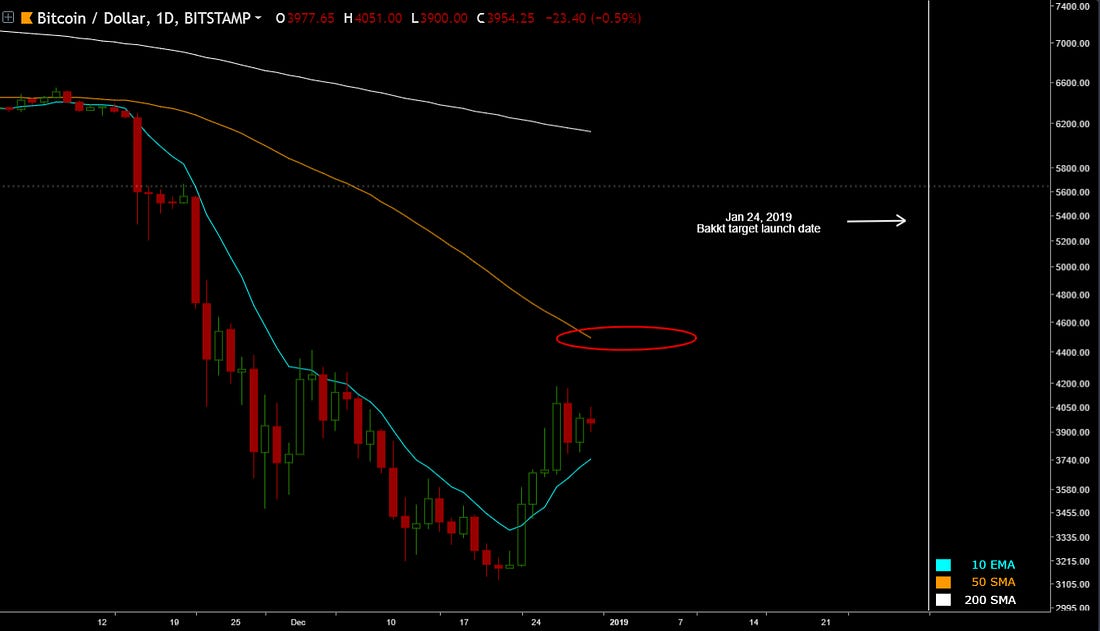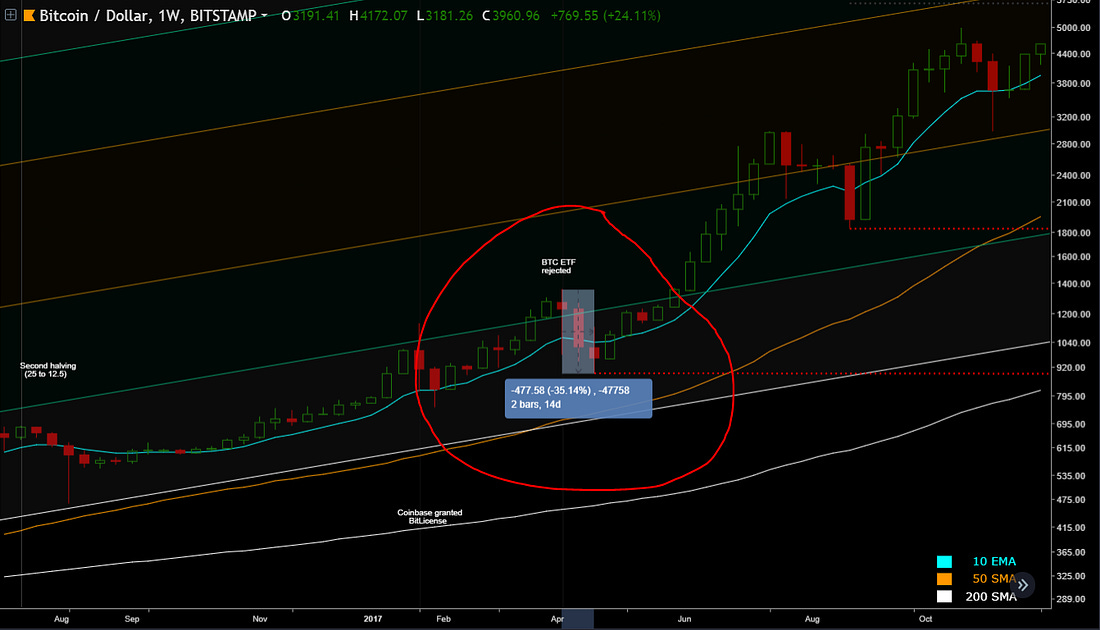Weekly BulletinNoticed some narrative crafting this week. It's along the theme of "Wall Street is leaving Bitcoin."
This narrative is stupidThis narrative is stupid because Wall Street isn't here yet. Folks on Wall Street make money by finding some sort of edge. Sometimes they have better fundamental analysis. How they don't make money is by buying and holding Bitcoin (because it's kinda hard being a hedge fund manager and telling your LPs that you're going to buy some Bitcoin and just chillax for a few years). Here's an excerpt from a blog by Jack Liu.
Facebook to develop its own stablecoin?It was reported a few days ago that Facebook is looking to develop its own stablecoin for money transfers. It appears to be a stablecoin for remittance payments to be used in India via WhatsApp. The keywords here are "looking to develop." Which means this project is still in the planning stage, and might not even happen. Vijay Boyapati made a good Twitter thread back in October discussing the potential entry of Facebook into the space and whether it's a threat to bitcoin. Let's take a look:  3/ But what is Facebook going to launch? I see three main possibilities and I want to consider whether each of them (A, B, C) pose a direct threat to #Bitcoin and what resources and comparative advantages Facebook might bring to bear in the cryptocurrency market. 3/ But what is Facebook going to launch? I see three main possibilities and I want to consider whether each of them (A, B, C) pose a direct threat to #Bitcoin and what resources and comparative advantages Facebook might bring to bear in the cryptocurrency market. 4/ A: FB launches a payment rail that allows their users to transfer digital currencies between each other, or perhaps allows merchants to accept them for payment. Such a service would directly compete with Square or Coinbase's merchant services. 4/ A: FB launches a payment rail that allows their users to transfer digital currencies between each other, or perhaps allows merchants to accept them for payment. Such a service would directly compete with Square or Coinbase's merchant services. 5/ The comparative advantage Facebook has if it pursued path A is its dominance in the messenger market (FB messenger & Whatsapp). There is a tremendous synergy between messaging and payments as can be witnessed by the success of WeChat Pay in China. https://t.co/1eqiXv8vjQ 5/ The comparative advantage Facebook has if it pursued path A is its dominance in the messenger market (FB messenger & Whatsapp). There is a tremendous synergy between messaging and payments as can be witnessed by the success of WeChat Pay in China. https://t.co/1eqiXv8vjQ 6/ Path A would be no threat to Bitcoin, however, because Bitcoin is nascent store of value, not a payment system. It is akin to how Visa and Amex do not compete with gold (gold, btw, has a much larger market cap than Visa and it only represents a fraction of the SoV market) 6/ Path A would be no threat to Bitcoin, however, because Bitcoin is nascent store of value, not a payment system. It is akin to how Visa and Amex do not compete with gold (gold, btw, has a much larger market cap than Visa and it only represents a fraction of the SoV market) 7/ B. Facebook launches their own digital currency over which they maintain substantial control. An example might be something similar to XRP (which Ripple controls) or EOS. 7/ B. Facebook launches their own digital currency over which they maintain substantial control. An example might be something similar to XRP (which Ripple controls) or EOS. 8/ Facebook could increase demand for such a currency by using the revenue stream they generate per user which they could issue as a dividend to holders of these tokens (or perhaps by buying up supply of the tokens and destroying them, as Binance does with BNB). 8/ Facebook could increase demand for such a currency by using the revenue stream they generate per user which they could issue as a dividend to holders of these tokens (or perhaps by buying up supply of the tokens and destroying them, as Binance does with BNB). 9/ Path B, again, does not compete directly with Bitcoin because Bitcoin is a *non sovereign* currency that has no centralized control. A Facebook controlled currency would still require trust of Facebook itself. 9/ Path B, again, does not compete directly with Bitcoin because Bitcoin is a *non sovereign* currency that has no centralized control. A Facebook controlled currency would still require trust of Facebook itself. 10/ FB has shown a worrying tendency to censor users and if it were to build its own currency it would need to comply with monetary regulations in all the jurisdictions in which the coin was used (i.e., everywhere). This would substantially increase their proclivity to censor. 10/ FB has shown a worrying tendency to censor users and if it were to build its own currency it would need to comply with monetary regulations in all the jurisdictions in which the coin was used (i.e., everywhere). This would substantially increase their proclivity to censor. 11/ C Facebook launches a currency over which they do NOT have control, but provides the source code to birth the currency and a means for distributing it. The major advantage FB has is their massive identity database (over 2 billion people). 11/ C Facebook launches a currency over which they do NOT have control, but provides the source code to birth the currency and a means for distributing it. The major advantage FB has is their massive identity database (over 2 billion people). 12/ Following path C, Facebook could undertake an airdrop far larger than anything anyone has ever done before. It could achieve a distribution of its token (FBCoin) across billions of people (BTC ownership in comparison is in the order of tens of millions of people). 12/ Following path C, Facebook could undertake an airdrop far larger than anything anyone has ever done before. It could achieve a distribution of its token (FBCoin) across billions of people (BTC ownership in comparison is in the order of tens of millions of people). 13/ Path C is by far the biggest threat to Bitcoin, if Facebook were to pursue it. However, distribution is not an overwhelming advantage. People who receive something for nothing are highly unlikely to value it; if FBCoin has any value at all most people are likely to dump it. 13/ Path C is by far the biggest threat to Bitcoin, if Facebook were to pursue it. However, distribution is not an overwhelming advantage. People who receive something for nothing are highly unlikely to value it; if FBCoin has any value at all most people are likely to dump it. 14/ This is similar to the fact that early users of Bitcoin who obtained it cheaply and did not appreciate its underlying value dumped it: 14/ This is similar to the fact that early users of Bitcoin who obtained it cheaply and did not appreciate its underlying value dumped it: Vijay Boyapati@real_vijay 2/ Consider, for example, this guy (and please don't be mean to him, most people were like this): https://t.co/7IAaA6orLS 15/ Furthermore, the main attributes that would drive demand for FBCoin vs Bitcoin would be censorship resistance and monetary policy. Bitcoin already has the best monetary policy possible for a SoV (a strictly limited supply) and it has shown itself resistant to attack. 15/ Furthermore, the main attributes that would drive demand for FBCoin vs Bitcoin would be censorship resistance and monetary policy. Bitcoin already has the best monetary policy possible for a SoV (a strictly limited supply) and it has shown itself resistant to attack. 16/ FBCoin, as the arriviste, would have to prove that it was superior to BTC along the important attributes that give BTC its value. Without a strong ethos of censorship resistance and sound money (definitely not present in Facebook's corporate culture) this threat is unlikely. 16/ FBCoin, as the arriviste, would have to prove that it was superior to BTC along the important attributes that give BTC its value. Without a strong ethos of censorship resistance and sound money (definitely not present in Facebook's corporate culture) this threat is unlikely.You can read my general thought's on centralized organizations that accumulate substantial chunks of your personal data in CoinSheet #232 (The Internet identity crisis). I'm interested in changing the way we think about money. I'm interested in open and borderless environments. I'm interested in open public blockchains that are about decentralizing trust. Bitcoin is a currency that's borderless, neutral, censorship resistant, open to all participants and is a trusted network despite having a lack of central governance. I don't have much faith in a Facebook-coin, Amazon-coin, or Google-coin because these companies have incentives that contradict with what I think we should be building. I'm sure we'll see something like a Facebook-coin in the future. And it will probably be some sort of payment service that competes with Square, Coinbase, Visa, Mastercard, Paypal, etc… I'm just not sure I'll care. Market SentimentBitcoinI had a few questions asked in the Telegram chat about how folks are coming up with these "bottom" predictions. I thought it would be useful to share some thoughts here. Below are the 3 most common scenarios I've seen being discussed.
I don't have a concrete opinion yet. I'm not that omniscient so I'm taking it one data point at a time. I'm currently waiting to see how the daily 50-SMA holds up. My hunch is that we're going to see a rejection of the daily 50-SMA in ~48 hours or so.
The general consensus seems to be that if Bakkt's futures launch, we will see some strong bullish price action for a few weeks leading up to the date of the VanEck ETF decision. Of course, a disapproval of VanEck's bitcoin ETF will probably crash Bitcoin prices 30% - 50%. This is why I'm hesitant about calling a bottom until we know what's going on with the ETF. Last time the ETF was rejected, price dropped ~35%.
Recommended ReadingsFour Crypto GospelsSu Zhu writes about regulatory clarity.
You can read the article here. If you think something important happened last week and we missed it, let us know! Continue the discussion in our Telegram group. That's all for now. Have a great week folks! You're on the free list for CoinSheet. For the full experience, become a paying subscriber. |







